Hieun SHIN
Fri, 31 May 2024
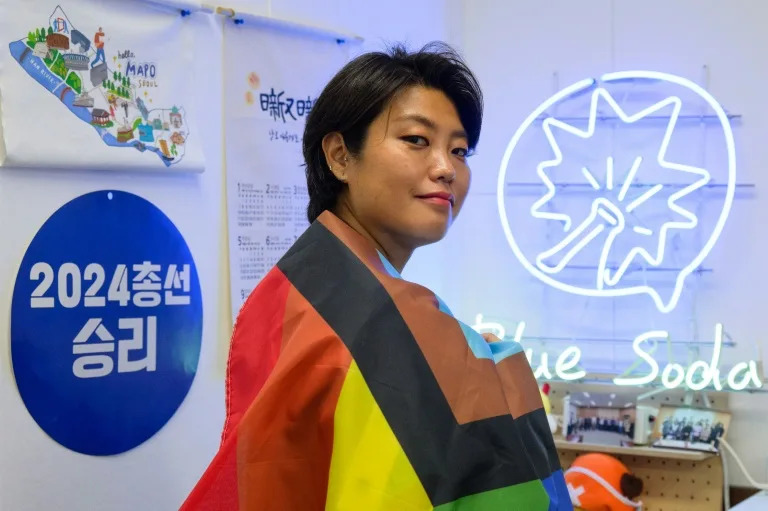
South Korea's first openly gay legislator Cha Hae-young, elected two years ago, says there is a long way to go to make the country's politics inclusive (Anthony WALLACE)
South Korea's first openly gay legislator may have cracked the ruling party's rainbow ceiling but admits there is a long way to go to make the country's politics inclusive.
In a milestone celebrated by the LGBTQ community, Cha Hae-young was elected to the Mapo district council on June 1, 2022 -- the same day as Seoul's annual LGBTQ Pride march.
Two years later, Asia's largest queer festival is once again being shunted away from the capital's central plaza after city officials said Saturday's planned celebrations could "provoke social conflicts".
The annual event attracts support from across the region, as well as strong opposition, especially from Christian groups.
Cha acknowledged many people in South Korea found it hard to discuss sexuality and LGBTQ matters, but said it was important that there was more public discussion of these issues in order to move forward.
Even within Cha's party, which holds the majority in parliament, "there is no strategy for how to discuss these opinions with the public."
"We need to show the people that we (LGBTQ people) exist," Cha, who uses they/them pronouns, told AFP.
Much of Cha's work has been about visibility -- a role they have adopted with personal gusto.
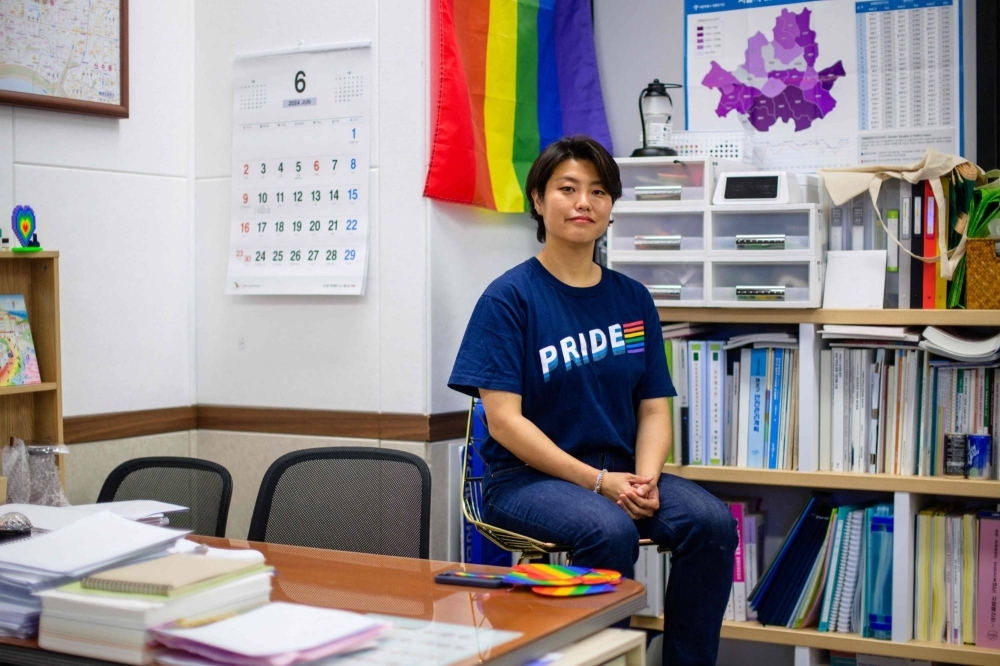
Their office, in an otherwise drab building in Seoul's Mapo district, is adorned with rainbow garlands and complete with a large Pride flag.
"The other council members were a bit surprised at first," Cha said.
"They are used to it now -- and to me."
Still, the burden of being the only out politician sometimes weighs on the 37-year-old former radio producer.
"For me, being gay is something to be proud of. But it also makes you vulnerable (as a politician)," said Cha, who has pushed for anti-discrimination and marriage equality legislation to be enacted.
- Pride backlash -
Seoul's queer festival will celebrate its 25th anniversary on Saturday.
But for the second year in a row, its organisers were denied permission to hold events at four locations in the capital -- including the central plaza for the main event.
City authorities have blamed scheduling clashes, and said the event could "provoke social conflicts".
But the festival's organisers have said this is not good enough.
"Equality means to have an event for sexual minorities in a public space -- to block it is inequality," said Yang Sun-woo, chair of the Seoul Queer Culture Festival.
"I would like to ask Seoul Mayor Oh Se-hoon if this is the 'global and leading city' he claims Seoul is," Yang added.
The city's conservative mayor Oh said last year he "personally can't agree with homosexuality" -- a stance that appears to clash with the Seoul's frequently stated goal of becoming an "open and inclusive city of mutual prosperity".
Clashes with police broke out at Pride event in the southern city of Daegu last June, after the city's mayor Hong Joon-pyo attempted to block the celebrations.
- Diversity calling -
But South Korea is facing a new reality: with one of the world's lowest birth rates, the ethnically homogenous society needs to welcome more immigrants -- and with them diversity.
Before that, "we need to show the people that we (LGBTQ people) exist," so they can see the diversity that exists in South Korean society already, Cha said.
Despite being South Korea's only openly LGBTQ elected official, Cha said they have found politics welcoming and productive.
A framed poster on their desk reads: "We welcome all races, all religions, all countries of origin, all sexual orientations, all genders. We stand with you, you are safe here".
Cha said they were hoping to make their party -- which holds a majority in parliament but does not control the presidency -- more open to all.
"As the majority party we need to move to an inclusive society, not an exclusionary one," said Cha, adding this will be the focus of their remaining two years in office.
"But a re-election is important because two years isn't enough time" to get all this done, they added.
hs/ceb/dhw/mtp
Tens of thousands of South Koreans celebrate Pride despite backlash
AFP
Sat, 1 June 2024
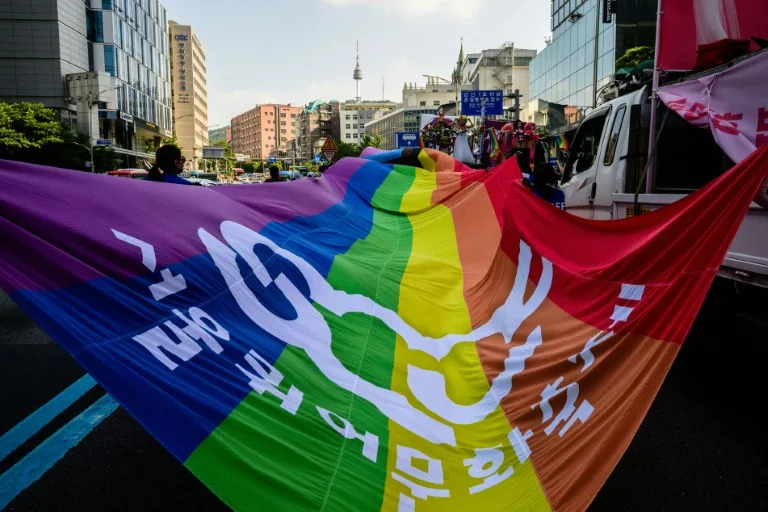
Seoul's Pride Parade, one of the largest in Asia, is expected to draw 150,000 this year (ANTHONY WALLACE)
Tens of thousands of LGBTQ South Koreans and their supporters gathered in central Seoul for annual Pride celebrations Saturday, despite the event's traditional venue being banned by authorities for the second consecutive year.
Same-sex marriage remains unrecognised in Asia's fourth largest economy, and activists have long emphasised the need for legislation outlawing discrimination on the basis of sexual orientation.
This year's Pride Parade, marking its 25th anniversary and one of the largest in Asia, was denied permission to gather at the Seoul Plaza in front of City Hall, where the main festivities have traditionally been held.
Seoul's conservative mayor Oh Se-hoon has said he "personally can't agree with homosexuality", but municipal authorities blamed a scheduling conflict and said the venue had already been reserved for an outdoor event themed around books.
It instead took place in the streets in central Seoul, with companies and organisations including the US embassy, IKEA, and Amnesty International participating to show support.
Areas surrounding Seoul's major thoroughfares Namdaemun-ro and Ujeongguk-ro were packed with excited participants wearing rainbow-themed costumes and make-up, some blowing bubbles and many waving orange balloons -- the theme colour for this year's edition.
"The colour range symbolises an intermediary quality between red and yellow. It doesn't belong anywhere but exists independently, ... akin to our queer way of being," organisers said in a statement.
According to the Pride organisers, three other venues managed by the Seoul city government, including the Seoul Museum of History, were also prohibited from being used for side events due to "causing social conflict".
The authorities' decision was "nonsensical", but it does not diminish the pride that LGBTQ individuals feel for the annual event, participant Na Joo-youn told AFP."
"I'm openly queer, which means I often have to fight for what I believe, which sometimes makes it hard to live as myself," Na, 26, said.
"Today, I get to enjoy being myself. Those who oppose the Pride Parade have been around for a long time, but whatever they do or say, they cannot erase our existence."
LGBTQ festivals have often been targeted by evangelical Christian groups, who have thrown water bottles and verbally abused Pride marchers and tried to block their route by lying down in the street in the past.
Just a few hundred metres away from the main streets where the festival was held, Christian protesters denounced LGBTQ rights, holding signs that read "No!! Same-sex Marriage" and "The country built with blood and sweat is collapsing due to homosexuality."
"We're opposing homosexuality because we want these who think they are 'homosexuals' to be truly happy by accepting God's ways, which only permit the union of a man and a woman," Jang Mi-young, a 65-year-old Christian protester, told AFP.
- Rights 'regressing' -
Nearly a quarter of South Korea's 52 million population is Christian and churches remain a significant political arena, particularly for legislators.
In addition to the festival still facing difficulties in securing venues, attempts to pass laws banning discrimination on the basis of sexuality have languished since around 2007, with lawmakers coming under pressure from conservative and religious organisations.
"It would not be an exaggeration to say that the human rights of sexual minorities in South Korean society are regressing, (rather than meeting) the global standards," Hyeonju, one of the festival's organisers, said.
This year's festival included a group of South Korean queers protesting against Israel's offensive in Gaza.
Waving the Palestinian flag and banners that read "From the river to the sea, Palestine will be free," they accused Israel of "pink-washing", or boasting of its acceptance of the LGBTQ community to cover up rights abuses against Palestinians.
"As the saying 'LGBTQ is everywhere' is not just a rhetorical statement but contains literal truth, many sexual minorities are living, getting hurt, and dying in Palestine, where a genocide is being committed," they said in a statement.
"Queers living in South Korea deeply wish for the survival and liberation of Palestinian queers."
After a quarter century, Thailand's LGBTQ Pride Parade is seen as a popular and political success
JINTAMAS SAKSORNCHAI
Fri, 31 May 2024
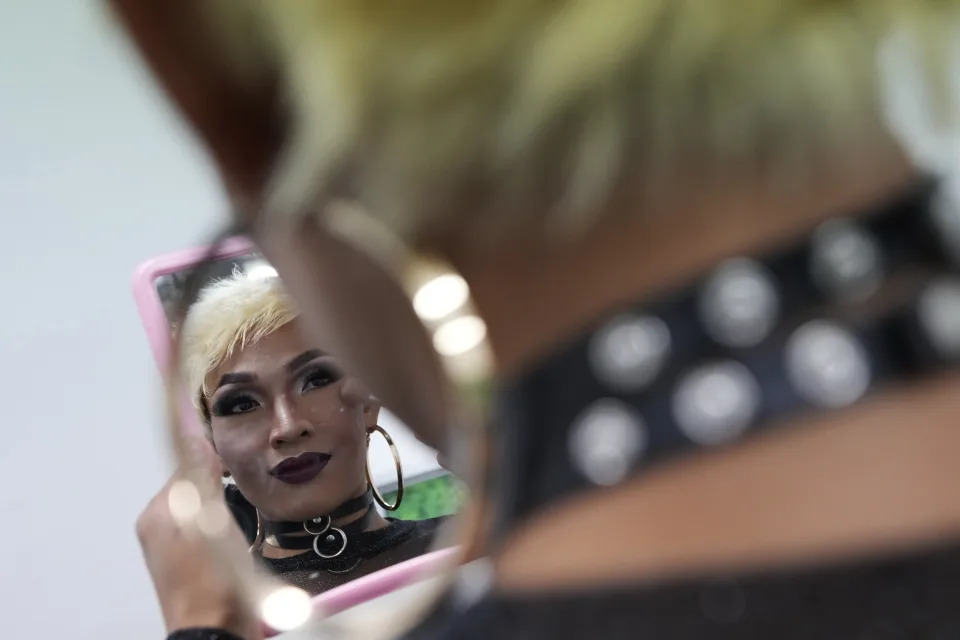
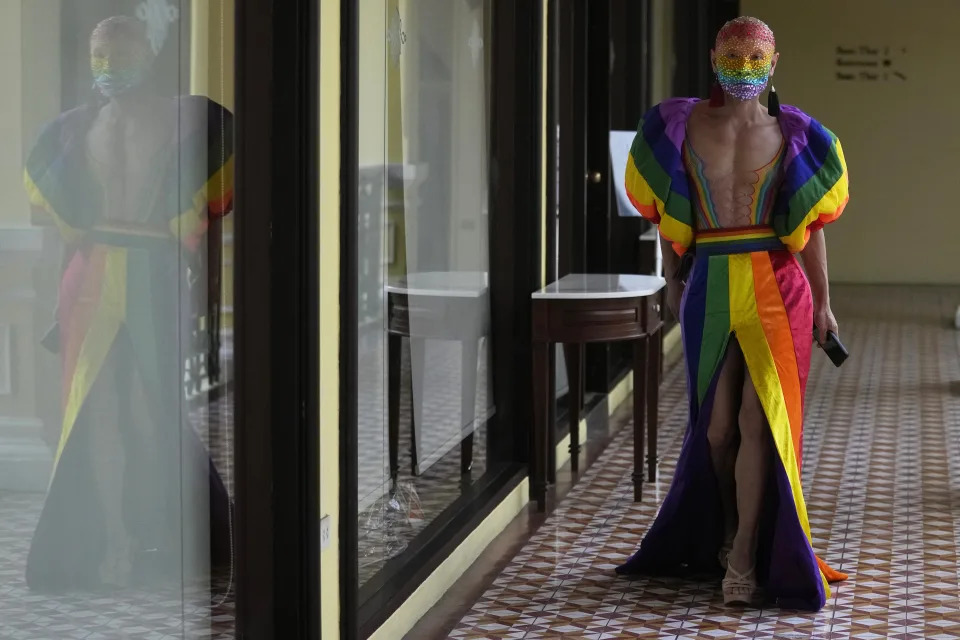
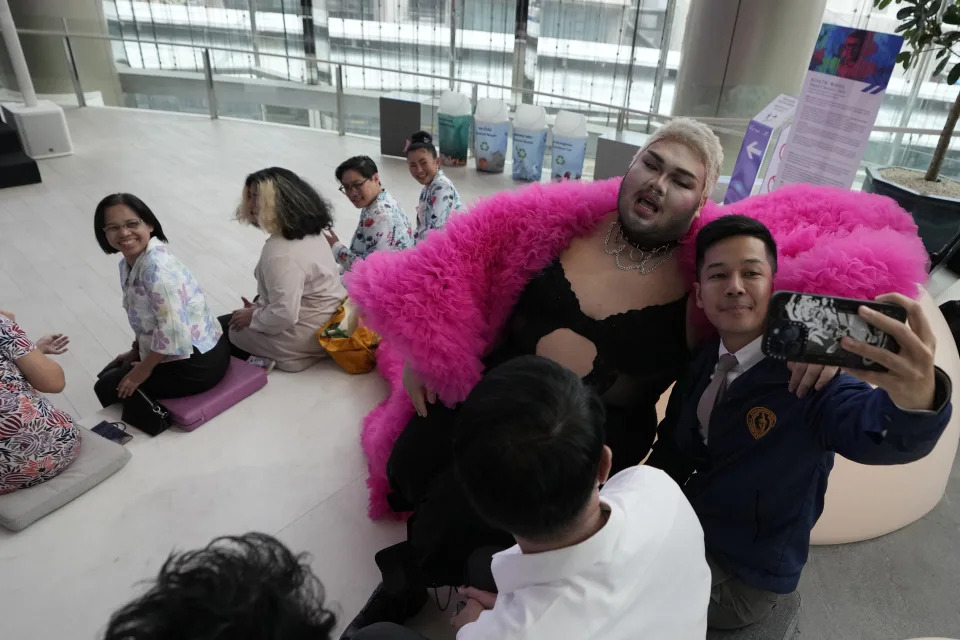
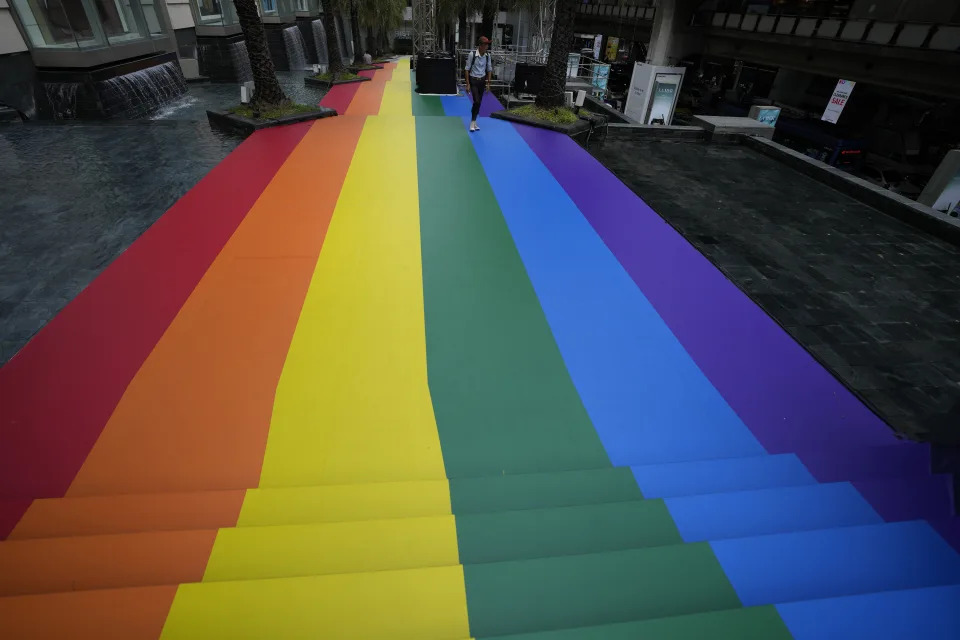
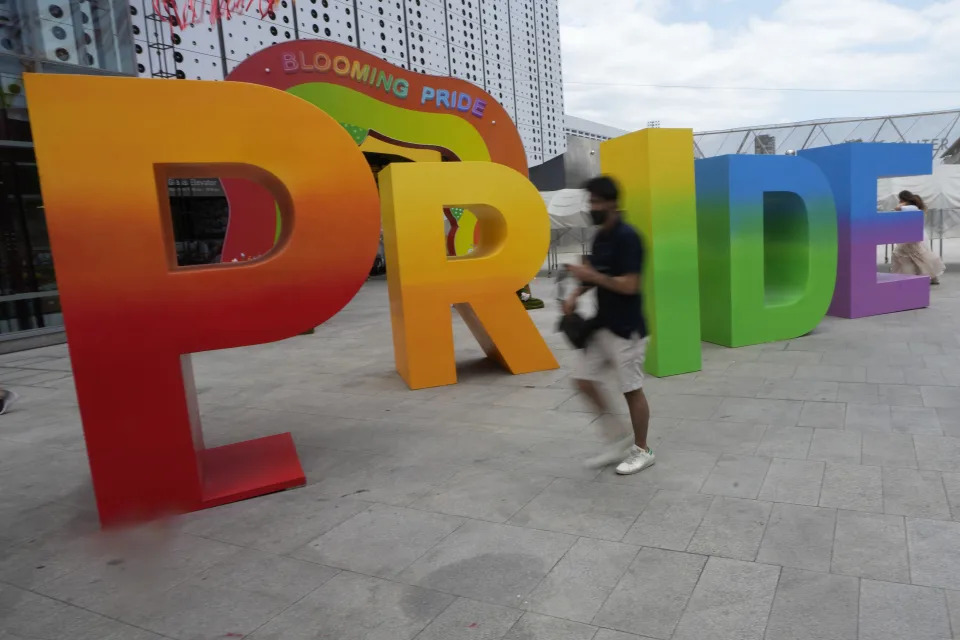
Thailand Pride Parade
A drag queen applies makeup on her face before a news conference on the Bangkok Pride in Bangkok, Thailand, Thursday, May 9, 2024. Thailand is kicking off its celebration for the LGBTQ+ community's Pride Month with a parade on Saturday, as the country is on the course to become the first nation in Southeast Asia to legalize marriage equality.
(AP Photo/Sakchai Lalit)
BANGKOK (AP) — Thailand is kicking off its celebration of the LGBTQ+ community’s Pride Month with a parade Saturday, as the country is on course to become the first nation in Southeast Asia to legalize marriage equality.
The annual Bangkok Pride Parade is expected to pack the streets in one of the Thai capital’s busiest commercial districts. Pride Month celebrations have been endorsed by politicians, government agencies and some of the country’s biggest business conglomerates, which have become official partners or sponsors for the celebration.
Ann “Waaddao” Chumaporn, who has been organizing Bangkok Pride since 2022, said in a recent interview with The Associated Press that she hopes the parade can be “a platform that allows everyone to call out for what they want and express who they really are.”
Waaddao thinks Thai society has shifted a lot from a decade ago, and the issue has now become a fashionable social and business trend.
Thanks in part to her work, a marriage equality bill granting full legal, financial and medical rights for marriage partners of any gender could become reality sometime this year.
But the public celebration of gender diversity was not always so popular in Thailand despite its long-standing reputation as an LGBTQ+ friendly country.
The first big celebration for the community in Thailand was held on Halloween weekend in 1999 and called the “Bangkok Gay Festival.” It was organized by Pakorn Pimton, who said that after seeing Pride parades on his overseas travels, he wanted Thailand to have one, too.
It was hard organizing such an event back then, when Thai society was much less open, he said.
“Everyone told me, even my boyfriend, that it would be impossible,” he said in an interview with AP.
Organizing such an event in a public space requires permission from authorities, and it didn’t go that smoothly for Pakorn, yet he eventually pulled it off.
Pakorn said some police officers treated him well, but there were others who gave him dirty looks, or were dismissive. He recalled hearing one officer say, “Why do you even need to do this? These katoey ...”
“Katoey,” whose rough equivalent in English would be “ladyboy,” has generally been used as a slur against transgender women or gay men with feminine appearances, although the word now has been claimed by the community.
After getting the permit, Pakorn, who then was actively working in show business, said he tried contacting television stations for advertising and finding sponsors for his project, but they all rejected him.
“There were no mobile phones, no Facebook, no nothing. There were only posters that I had to put up at gay bars,” he said.
Because of that, Pakorn said, he was bewildered to see thousands of people, not only Thais but many foreigners, take to downtown Bangkok's streets for that first celebration in colorful and racy costumes, carrying balloons and dancing on fancy floats.
The event got attention from both domestic and international media as both Thailand’s first gay parade and one of the first in Asia. It was described as energetic and chaotic, not least because the police did not completely close it off from traffic, resulting in marchers, dancers and floats weaving their way through moving buses, cars and motorbikes.
Pakorn organized it for several more years but eventually stopped.
Only recently did the political significance behind the term “Pride” gain much importance in the event, said Vitaya Saeng-Aroon, director of an advocacy group Diversity In Thailand.
Previously, there were not a lot of organized LGBTQ+ communities who joined in, “so there were no messages in the parade. It became like a party just for fun," he said.
Now the parade carries a more political tone because the observance has been organized by people like Waaddao who have long worked to raise awareness on gender equality and diversity.
For her part, Waaddao said she became inspired to organize the parade after taking part in the youth-led pro-democracy protests that sprang up across the country in 2020. She said she had previously been carrying out her advocacy work mostly in conference rooms, but those protests convinced her that street action can also advance a political agenda.
Although the pro-democracy movement lost steam due to the coronavirus pandemic and repression, Waaddao decided to continue the struggle for equal marriage and gender equality, ushering in a new era for Pride activities in 2022.
That was the year that several draft bills for marriage equality or civil partnership were introduced in Parliament. Although none managed to pass during the government then in power, a marriage equality bill sponsored by the current administration is expected to get through second and third readings by the Senate later this month, its last legislative hurdle before getting royal endorsement and becoming law.
No comments:
Post a Comment